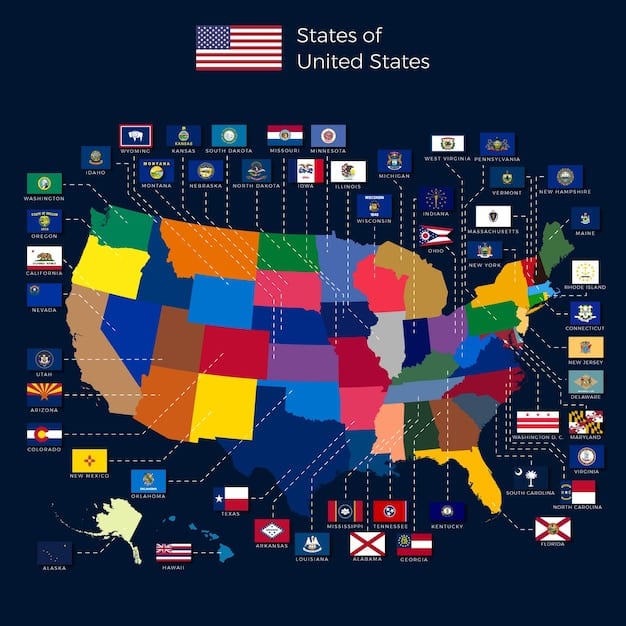Esports Betting in the US: Legal Landscape & LoL Tournaments

Esports betting in the US is navigating a complex legal landscape, with regulations varying by state, impacting the accessibility and types of wagering available for League of Legends tournaments and other esports events.
The burgeoning world of esports has collided with the established arena of sports betting, creating a dynamic and rapidly evolving industry. This is particularly evident in the United States, where the legalization of sports betting is occurring state by state, leading to a patchwork of regulations impacting how fans can engage with their favorite games like Esports Betting in the US: Legal Landscape and Impact on League of Legends Tournaments. This article delves into the legal landscape of esports betting in the US and examines its impact on League of Legends tournaments.
Esports betting legality in the united states
The legality of esports betting in the United States is not a straightforward matter. Unlike traditional sports betting, which has a longer history and more established regulatory frameworks, esports betting exists in a gray area, with many states still grappling with how to classify and regulate it. This section explores the current legal landscape, highlighting the key challenges and developments.
State-by-State Regulations
The United States operates under a system of federalism, where individual states have the power to legislate on many issues, including gambling. As a result, the legal status of esports betting varies significantly from state to state. Some states have explicitly legalized and regulated esports betting, while others remain silent or have taken a restrictive stance.
Key States and Legislation
Several states have emerged as leaders in the regulation of esports betting. These states have typically amended their existing sports betting laws to include esports or have passed new legislation specifically addressing it. Understanding the approaches taken by these states provides insight into the future of esports betting regulation in the US.
- Nevada: Among the first states to legalize sports betting, Nevada has been cautious in its approach to esports.
- New Jersey: A pioneer in online gambling, New Jersey includes esports within its sports betting framework.
- Indiana: Indiana’s sports wagering law allows for esports betting under specific conditions.
- Tennessee: Tennessee’s unique online-only sports betting model also encompasses esports.

The legal landscape is constantly shifting as more states consider legalizing and regulating esports betting. Keeping track of these developments is crucial for anyone involved in the industry, from operators to fans.
Defining esports for regulatory purposes
One of the main challenges in regulating esports betting is defining what exactly constitutes an “esport.” Traditional sports are generally well-defined, but esports encompass a wide range of video games, each with its own rules, formats, and player base. This section delves into the difficulties surrounding the definition of esports for regulatory purposes.
Skill vs. Chance
A fundamental question in determining the legality of esports betting is whether esports are games of skill or games of chance. Most regulators and legal experts agree that esports primarily involve skill, as the outcome of a match is largely determined by the players’ abilities, strategies, and teamwork. However, some argue that elements of chance, such as random number generators in certain games, could classify esports as gambling.
Game-Specific Considerations
The classification of esports may also vary depending on the specific game in question. Games like League of Legends, Dota 2, and Counter-Strike: Global Offensive are widely recognized as skill-based esports, while others may be more contentious. Regulators must consider the specific characteristics of each game when determining whether it is suitable for betting.
Impact on League of Legends Tournaments
The debate over defining esports has direct implications with Esports Betting in the US: Legal Landscape and Impact on League of Legends Tournaments. If regulators view League of Legends as a game of skill, betting on its tournaments is more likely to be legalized. Conversely, if doubts remain about the skill-based nature of the game, the path to legalization may be more challenging.
The varying definitions and classifications of esports create complexity for regulators, operators, and fans. A consistent and clear definition is essential for the growth and sustainability of the esports betting industry in the US.
The impact of esports betting on league of legends tournaments
The legalization and regulation of esports betting can have a significant impact on League of Legends tournaments. increased viewership and engagement, enhanced sponsorship opportunities, and potential integrity concerns. This section explores both the positive and negative aspects of this impact.
Increased Viewership and Engagement
Esports betting can drive viewership and engagement for League of Legends tournaments. When fans have a financial stake in the outcome of a match, they are more likely to tune in and follow the action closely. This increased attention can benefit tournament organizers, teams, and players.
Enhanced Sponsorship Opportunities
The link between esports betting and traditional sports betting also opens up new sponsorship opportunities for League of Legends tournaments and teams. Betting operators often seek to partner with esports organizations to promote their brand and reach a wider audience. These sponsorships can provide valuable revenue streams for the esports ecosystem.
Integrity Concerns and Match Fixing
The most serious risk associated with esports betting is the potential for match-fixing. When large sums of money are wagered on matches, there is a greater incentive for players or teams to manipulate the outcome for financial gain.

Safeguarding Tournament Integrity
To prevent match-fixing and maintain the integrity of League of Legends tournaments, various measures can be implemented, including:
- Education and Training: Providing players and teams with education and training on the dangers of match-fixing.
- Monitoring and Surveillance: Implementing systems to monitor betting patterns and detect suspicious activity.
- Collaboration with Regulators: Establishing partnerships with regulatory bodies to share information and enforce regulations.
Esports betting has the potential to greatly enhance the League of Legends tournament experience, but it also poses risks that must be carefully managed. By implementing robust integrity measures, the esports community can safeguard the fairness and legitimacy of its competitions.
Challenges and opportunities for operators
Esports betting operators face a unique set of challenges and opportunities in the US market. Navigating the fragmented regulatory landscape, addressing concerns about integrity, and appealing to an audience are among the key considerations. This section explores these challenges and opportunities in detail.
Navigating the Regulatory Landscape
The lack of a unified federal framework for esports betting means that operators must navigate a complex web of state-specific regulations. This can be a costly and time-consuming process, as operators must obtain licenses and comply with different rules in each state where they wish to operate.
Addressing Integrity Concerns
As discussed earlier, integrity is a major concern for esports betting operators. To gain the trust to the community operators must invest in measures to prevent match-fixing and maintain the fairness of.
Appealing to the Audience
Esports fans represent a unique demographic with specific preferences and expectations. Operators must understand this audience and tailor their products and marketing efforts accordingly. This includes offering a wide range of betting options, providing competitive odds, and engaging with the esports community through social media and other channels.
Esports betting operators can overcome these challenges and capitalize on the growing popularity of esports in the US. These operators have the opportunity to shape the market.
The future of esports betting in the US
The future of esports betting in the US looks promising, with further legalization and regulation. The continued growth of the esports industry, coupled with increasing acceptance of online gambling, suggests that the market will continue to expand in the coming years. This section explores future trends and predictions for the industry.
Further Legalization and Regulation
As more states recognize the potential benefits of esports betting, it is likely that they will move to legalize and regulate the industry. This could lead to a more harmonized regulatory framework, making it easier for operators to enter the market and for fans to place bets.
Technological Advancements
Technological advancements will also play a key role in the future of esports betting. Innovations such as live streaming, virtual reality, and artificial intelligence could enhance the betting experience and create new opportunities for engagement.
The esports betting industry is poised for continued growth in the US, potentially reaching a massive market. Operators, regulators, and fans will need to collaborate to and create an exciting market.
Responsible gambling and esports
As esports betting becomes more prevalent, responsible gambling becomes a critical consideration. Esports, with its young audience, needs a focused approach for advertising practices of betting.
Education and Awareness
Operators, regulators, and the esports community must work together to promote education and awareness about responsible gambling. This includes providing information on the risks associated with gambling, promoting responsible betting habits, and offering resources for those who may be struggling with addiction.
Age Verification and Restrictions
Strict age verification measures are essential to prevent underage gambling. Operators should implement robust systems to verify the age of their customers and prevent minors from placing bets. Additional restrictions, such as deposit limits and self-exclusion programs, can also help to protect vulnerable individuals.
Partnerships and Collaborations
Responsible gambling organizations, research institutions, and esports stakeholders can help create standards for social responsibility. These create measures promoting safe gambling and protecting the esports community.
| Key Point | Brief Description |
|---|---|
| ⚖️ Legal Landscape | The legality of varies by state in the US, creating a complex regulatory environment. |
| 🎮 Impact on LoL | Esports betting can increase viewership and sponsorship for League of Legends tournaments. |
| 🛡️ Integrity Concerns | Match-fixing poses a serious risk to the integrity of esports, requiring vigilance. |
| 🔞 Responsible Gambling | Promoting responsible gambling and safeguarding against underage betting are essential. |
FAQ
The legality of esports betting varies by state. Some states have legalized and regulated it, while others have not. Check your state’s laws for the most up-to-date information.
Esports betting can increase viewership and engagement, as well as sponsorship opportunities, for League of Legends tournaments. It also raises concerns about match-fixing.
Education and training for players, monitoring of betting patterns, and collaboration with regulators are vital to safeguard tournament integrity and keep the tournaments fair.
Operators must navigate a fragmented regulatory landscape, address integrity concerns, and appeal to a unique demographic of esports fans with specific expectations for games.
Education and awareness campaigns, strict age verification measures, and partnerships with responsible gambling organizations are promoted to ensure that fans have a safe time betting.
Conclusion
Esports Betting in the US: Legal Landscape and Impact on League of Legends Tournaments is at a pivotal stage. As the legalization movement continues, stakeholders must address the concerns tied to this and take steps to safe guard gamblers ensuring the integrity and long term sustainability of the League of Legends competitions.





